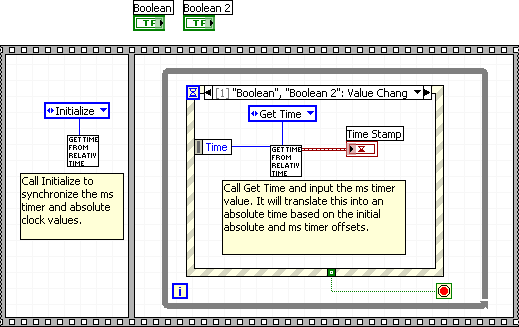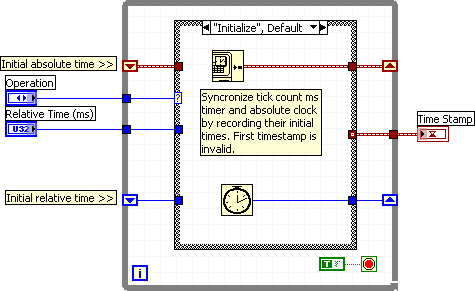Turn on suggestions
Auto-suggest helps you quickly narrow down your search results by suggesting possible matches as you type.
Showing results for
Topic Options
- Subscribe to RSS Feed
- Mark Topic as New
- Mark Topic as Read
- Float this Topic for Current User
- Bookmark
- Subscribe
- Mute
- Printer Friendly Page
Even structure time
Member
04-18-2007 12:35 PM
Options
- Mark as New
- Bookmark
- Subscribe
- Mute
- Subscribe to RSS Feed
- Permalink
- Report to a Moderator
Can anybody tell me in what format the time is in the event structure?
I need the time an event is executing, but if I convert it from seconds to Date/Time it give me a spurious date/time.
If I use a get time “Get Time/Date I Seconds”, I get the current time.
I’m using Labview 8.2 on XP O/S
Active Participant
04-18-2007 12:45 PM
Options
- Mark as New
- Bookmark
- Subscribe
- Mute
- Subscribe to RSS Feed
- Permalink
- Report to a Moderator
It's a millisecond timer from the OS. It is relative time and doesn't correspond to any actual date and time. It's good for telling the difference in time between two events, but not for establishing when an event took place. It's output is essentially the same as the Tick Count function.
Your best bet if you need absolute time seems to be to just use the Get Date Time in Seconds instead of using the Time terminal in the Event Structure. Granted, this will tell you when the event was handled, not when it was fired, but it might help.
If that isn't good enough, you could correlate the relative millisecond clock with an actual time value and then do a little math to calculate the absolute time from the ms timer. I'll post an example that might help you get started.
Your best bet if you need absolute time seems to be to just use the Get Date Time in Seconds instead of using the Time terminal in the Event Structure. Granted, this will tell you when the event was handled, not when it was fired, but it might help.
If that isn't good enough, you could correlate the relative millisecond clock with an actual time value and then do a little math to calculate the absolute time from the ms timer. I'll post an example that might help you get started.
Jarrod S.
National Instruments
National Instruments
Active Participant
04-18-2007 01:08 PM
Options
- Mark as New
- Bookmark
- Subscribe
- Mute
- Subscribe to RSS Feed
- Permalink
- Report to a Moderator
Save the two VIs and open Example Get Time.vi. This uses a functional global (i.e. Action Engine) called Get Time from Relative Time to synchronize the timer ms clock values with an absolute time. After being initialized, it will translate any timer ms value into an absolute time.
Note: The timer ms value is a U32 that will eventually roll over (perhaps every six months or so). Rolling over once will not affect this VI, but rolling over twice will. So make sure to restart the program once a year!
Note: The timer ms value is a U32 that will eventually roll over (perhaps every six months or so). Rolling over once will not affect this VI, but rolling over twice will. So make sure to restart the program once a year!
Jarrod S.
National Instruments
National Instruments
Download All
Virus scan in progress. Please wait to download attachments.
Active Participant
04-18-2007 01:20 PM - edited 04-18-2007 01:20 PM
Options
- Mark as New
- Bookmark
- Subscribe
- Mute
- Subscribe to RSS Feed
- Permalink
- Report to a Moderator
Here are the pics for anyone without LabVIEW 8.2.



Message Edited by Jarrod S. on 04-18-2007 01:21 PM
Jarrod S.
National Instruments
National Instruments
Download All
Virus scan in progress. Please wait to download attachments.
04-20-2007 02:09 AM
Options
- Mark as New
- Bookmark
- Subscribe
- Mute
- Subscribe to RSS Feed
- Permalink
- Report to a Moderator
Thank you for the information, I just find it strange that they did not use the “normal” time philosophy. (Seconds since 1904).
